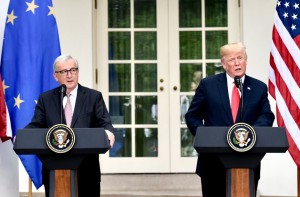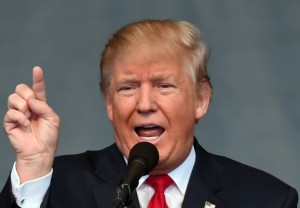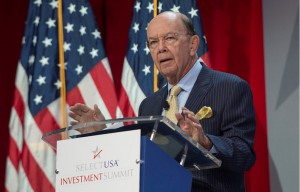
European Commission President Jean-Claude Juncker, left, and President Donald Trump met to discuss a new trade deal.
A large group of the United States’ top trading partners gathered in Geneva this week to discuss a variety of countermeasures against the U.S. should the Trump administration decide to implement a new set of automotive tariffs.
Deputy trade ministers from Canada, Mexico, Japan, South Korea and the European Union created an outline of possible actions they could take in the event Trump imposes tariffs on foreign imports as a result of the U.S. Commerce Department’s investigation to determine if those imports represent a threat to U.S. national security.
The group revealed it is considering several options, including an appeal to the World Trade Organization’s dispute settlement system and the imposition of retaliatory tariffs against U.S. goods, Bloomberg News reported.
“It’s fair to say we all share the same concern that should Section 232 be applied, countries will consider their options,” Mexico’s Undersecretary of Foreign Trade Juan Carlos Baker said in an interview following the meeting.
(Auto suppliers growing pessimistic about near-term prospects. Click Here for the story.)

President Donald Trump ordered Commerce Secretary Wilbur Ross to investigate to see if auto trade represents a threat to the U.S.
The meeting also gave European Commission President Jean-Claude Juncker an opportunity to update attendees about the meeting between Juncker and Trump last week. Though not much has been revealed from the meeting, a new set of tariffs that were set to go against the EU were delayed after the sides agreed to engage in a new round of trade talks.
Commerce Secretary Wilbur Ross continues to lead the investigation during the those talks. The Section 232 query is not expected to be completed until the end of August or early September, according to Ross.
The convention of the U.S. trade partners is significant, if for no other reason than financially. The group that met in Geneva accounts for nearly $1 trillion worth of annual auto exports to the rest of the world, according to the International Trade Center.
(Click Here to see why NAFTA talks are halted — for now.)
While discussions focused on possible responses, the group also reviewed possible remedies to issues with the WTO. Trump has almost made it a habit to ignore the protocols put in place through the organization through the implementation of the current and potentially future tariffs.

Commerce Secretary Wilbur Ross is leading the Section 232 investigation into whether or not imported automobiles and parts represent a threat to the United States.
He’s also gummed up the works at the WTO by blocking nominees to the WTO’s dispute-resolution panel, a practice that has hampered the group’s ability to perform its job and could make it difficult to perform other functions for which it was designed, such as dispute mediation and negotiation, Bloomberg reported.
The talks aren’t done either as Jim Carr, Canada’s Minister of International Trade, invited a dozen trade ministers to meet in Canada in October to engage it further discussions about the WTO. The European Commission is separately considering a draft proposal to address some of the Trump administration’s concerns and offer ways to fill gaps in the WTO’s 23-year-old rule book, Bloomberg noted.
(To see why automakers warned Trump administration about tariffs, Click Here.)
All of this is happening while the U.S. is engaged in discussions with China to avoid a larger trade war with the country that is all but assured of happening if a new $16-billion round of U.S. tariffs takes effect this week. The new levies had been suspended pending talks on a potential new trade agreement, but the two sides have engaged in more posturing than actual negotiations.
